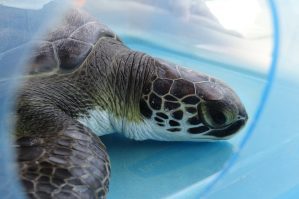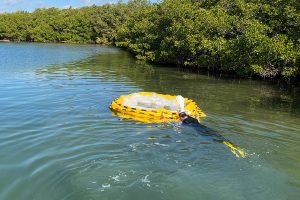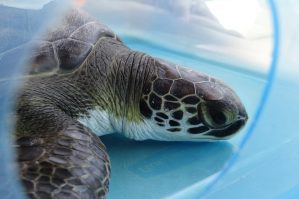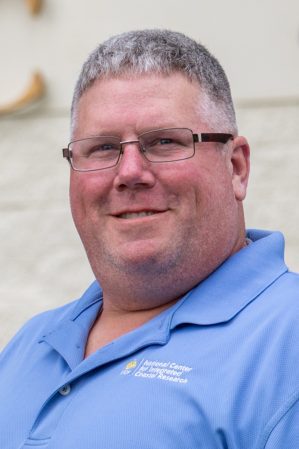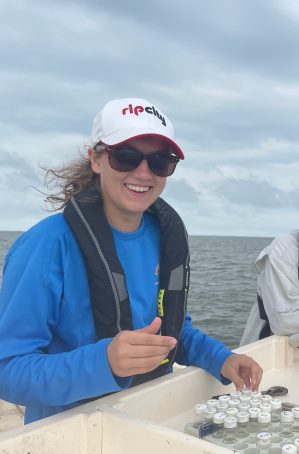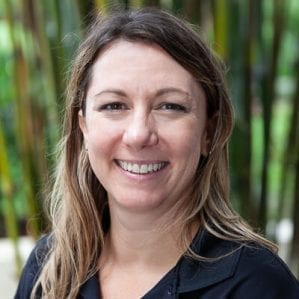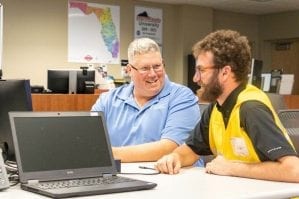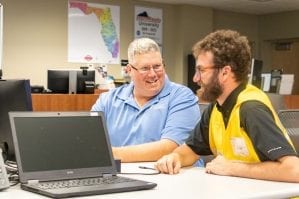-
UCF Researchers Are Contributing to World Oceans Day
One of Florida’s most precious resources is its water from the aquifer to the 8,436 miles of coastline, boarded by the Gulf of Mexico, the Straits of Florida, and the Atlantic Ocean. Water is also a major player in the state’s economy, contributing $56 billion to the economy and generating 900,000 jobs according to a […]
-
UCF Researchers Help Lead New, $2 Million NSF Project to Make Coastal Sciences More Inclusive
University of Central Florida Coastal researchers are part of a new, $2 million U.S. National Science Foundation-funded project to work toward a more inclusive field of marine sciences. The Coastal and Estuarine Research Federation (CERF), an estuary research nonprofit, is leading the project, which includes six partner agencies and universities, including UCF. The collaboration is […]
-
UCF Uses 6-Foot ‘Test Tubes’ to Study Red Tide
A potential treatment for Florida’s devastating red tides took another step toward widespread deployment after successful testing in Sarasota Bay. Additional detailed data analysis is required to confirm results, but UCF Assistant Professor of Biology Kristy Lewis is encouraged by the large-scale test of a red tide mitigation technology called clay flocculation that was performed […]
-
UCF Researchers Are Contributing to World Oceans Day
One of Florida’s most precious resources is its water from the aquifer to the 8,436 miles of coastline, boarded by the Gulf of Mexico, the Straits of Florida, and the Atlantic Ocean. Water is also a major player in the state’s economy, contributing $56 billion to the economy and generating 900,000 jobs according to a […]
-
New Tool from UCF-led Team Shows Homeowners and Renters the True Cost of Disasters
In some areas of the Southeast, such as Florida, the housing market is booming, but with hurricanes and other natural disasters posing annual threats, the true cost of owning a home in the region may be largely unknown. That’s why the University of Central Florida and a team of researchers from across the country have […]
-
Scientists Work to Ensure Solutions to Red Tide Don’t Cause More Harm than Good
A team of experts from Florida and Massachusetts are evaluating a technique that may help eliminate the algae blooms that cause massive fish kills, stink up neighborhoods and disrupt the Florida economy. A recent large-scale experiment promises a deeper understanding of how marine life responds to a red tide mitigation technique called clay flocculation. Red […]
-
Fellowship Fuels Future Forage Fish Research
An ongoing study into the intricate food webs of Florida’s coastal environments recently received a boost from the Florida Fish and Wildlife Conservation Commission (FWC). The $15,000 fellowship was awarded to Biology graduate student Kira Allen, who is writing a thesis on the impact of freshwater diversion and sea level rise on Apalachicola Bay. […]
-
New Grant Funds ‘Boots on the Ground’ Approach To Studying Wetland Loss
A new grant from the National Academies of Sciences will fund a “boots on the ground” approach to evaluating how severe wetland loss impacts the recreational fishing industry. Kristy A. Lewis, Ph.D, and her team at the Lewis Lab of Applied Coastal Ecology received the $110,662 grant in collaboration with Louisiana State University to help […]
-
Reducing Property Risks by understanding Natural Hazard Risks
By D’Ann Rawlinson Our goal is to show people common natural hazards in their area, the average annual occurrence of those hazards and ways to mitigate risks, including estimated costs. An interdisciplinary team of researchers led by Chris Emrich, associate professor of public administration at UCF and a member of UCF Coastal, is developing web […]
-
UCF Scientists Study Method to Combat Florida Red Tide
An inexpensive, natural countermeasure to curb the devastating economic and ecological impacts of Florida red tide is now under study at UCF. The study focuses on spraying a clay solution to sink the cells (flocculate) of Karenia brevis (known commonly as Florida red tide) to the bottom sediments. Florida red tide is the algae responsible […]
-
Research: Pandemic Threatens To Widen Pre-Existing Academia Inequities
New research argues the pandemic will widen pre-existing inequities in the academic community if preventative measures aren’t taken. The 17 authors of “In the wake of COVID-19, academia needs new solutions to ensure gender equity,” published in the Proceedings of the National Academies of Sciences, say it’s not enough to provide a one-size-fits-all solution to […]
-
UCF Receives $3.4 Million Grant to Help Homeowners Evaluate Property Risks
By ZENAIDA GONZALEZ KOTALA When buying a home, people often weigh the quality of the schools, crime rates, cost and property values into their buying equation. Rarely do they think about disaster risk, mostly because there is no easy way to do so. University of Central Florida Professor Chris Emrich and his team are about to change […]

